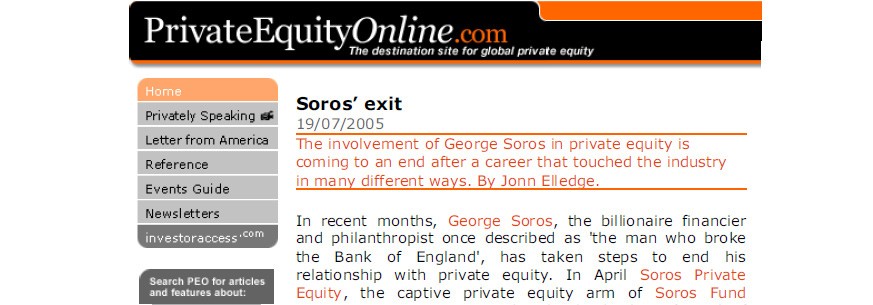The involvement of George Soros in private equity is coming to an end after a career that touched the industry in many different ways.
In recent months, George Soros, the billionaire financier and philanthropist once described as ‘the man who broke the Bank of England’, has taken steps to end his relationship with private equity. In April Soros Private Equity, the captive private equity arm of Soros Fund Management, spun out under the leadership of co-chief executive officers Neal Moszkowski and Ramez Sousou. Last moth TowerBrook capital Partners, as it is now known, completed its first deal as an independent firm with the refinancing of a portfolio company, the German latex producer PolymerLatex.
Although Soros will still act as an advisor and co-investor to TowerBrook, his involvement with the firm has been significantly scaled down. The spin-off is part of a wider move by the financier, who is now 75, to hand greater control of Soros Fund Management to his sons Rober and Jonathan, and to refocus the group on its core business as a hedge fund manager. In recent months the group has also spun off its real estate and credit arms under the names Grove Capital and Dune Capital Management respectively.
Soros’ impact on the private equity world has been significant. In addition to its core LBO business, Soros Fund Management has also been home to Soros Real Estate Investors, a $1 billion fund investing in property in Europe and Japan, and the Southeast European Equity Fund, a vehicle set up alongside the Overseas Private Investment Corporation to invest in businesses in the region.
What’s more, not only did Soros Private Equity participate in such major deals as the €3 billion LBO of Irish telecoms group EirCom in October 2001, it also helped launch other general partner groups. In April last year its former partner Miltos Kambourides launched Dolphin Capital Partners to invest in the south-eastern Europe holiday home market. The following month the group assisted Spanish financiers Jaime Bergel and Carlos Tejera to set up their own private equity vehicle to invest in Spain and Portugal.
Despite Soros being responsible directly or indirectly for a string of private equity firms, the asset class has played a relatively minor part in his fifty-year career as a financier, activist and writer. Born in Budapest in 1930, he began his career in finance by trading currencies on the city’s post-war black market at the age of 15.
In the early 1950s he attended the London School of Economics. There he met the Austrian-British philosopher Karl Popper, who he admired so much that he began work on his own grand essay, “The Burden of Consiousness”. His failure to pluck up the nerve to show the work to his mentor provided the title for the first chapter of his book, “Soros on Soros: The Failed Philosopher”.
In 1969, after thirteen years as a stockbroker, he set up the Quantu, Fund, one of the world’s first hedge funds. Four years later he launched Soros Fund Management, which over the next two decades would grow into a one-stop shop for alternative asset investors. But what brought his funds to the public eye was not their huge success – an investment of $1000 in Quantum in 1969 was worth more than $3 million thirty years later – but the benefits they reaped from a British economic crisis: in 1992 Soros borrowed heavily to bet on a devaluation of sterling, and made a tidy $1 billion when the UK crashed out of the European Exchange Rate Mechanism. It was this that won him his sobriquet as a bank breaker.
Soros has also won a reputation as a great philanthropist through such actions as investing in a chain of nursery schools in central Europe, endowing an academy in Budapest, and funding black students to attend university in apartheid South Africa.
His charity, however, has not always made him popular with the authorities. His support for the ‘rose revolution’ in Georgia in 2003 led some in Russia to conclude that he had engineered the event on behalf of the American government. This would come as something of a surprise to that government, as he has donated millions to liberal action groups such as moveon.org and once described removing President Bush from office as ‘the central focus of my life’.
Perhaps inevitably, Soros’ political stance occasionally catches up with Soros the investor. In June for example, congressional Republicans began a campaign to prevent a consortium including Soros from winning control of the Washington Nationals baseball team on the grounds of his partisanship. (A rival bid from another private equity professional and former Republican White House staffer, Fred Malek of Thayer Capital Partners, attracted no such criticism from his fellow Republicans).
Soros once described himself as ‘the kind of nut who wants to have an impact’. Love him or loath him, it’s hard to deny that through both his involvement in alternative assets and his philanthropy, he has succeeded.

